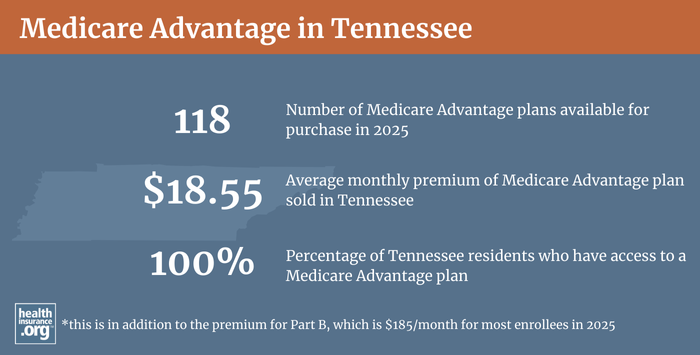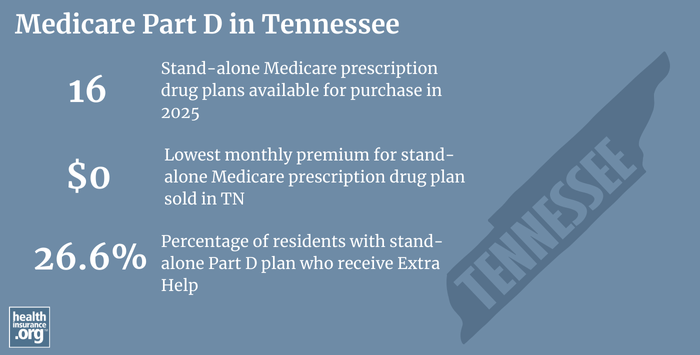Medicare in Tennessee

Since 2011, Tennessee has protected access to Medigap plans for disabled beneficiaries under age 65, but their premiums are much higher
Key takeaways
- More than 1.4 million people are enrolled in Medicare in Tennessee.1
- Over half of Tennessee Medicare beneficiaries select Medicare Advantage plans.1
- Tennessee law guarantees access to Medigap plans for enrollees under age 65, but insurers can charge them much higher premiums.
- About 80% of Tennessee Medicare beneficiaries have Medicare Part D prescription drug coverage, either as a stand-alone policy or as part of a Medicare Advantage plan.1

Tennessee Medicare enrollment
As of September 2024, Tennessee Medicare enrollment stood at 1,481,087,1 including those with Original Medicare and those with Medicare Advantage plans. That’s about 20% of the state’s total population. efn_note]U.S. Census Bureau Quick Facts: United States & Tennessee.” U.S. Census Bureau, July 2023.[/efn_note]
Of Tennessee’s Medicare beneficiaries, 86% are eligible based on their age (ie, being at least 65 years old), while the other 14% percent are eligible due to a disability (24+ months of receiving Social Security Disability Insurance, or a diagnosis of ALS or end-stage renal disease).1
Learn about Medicare plan options in Tennessee by contacting a licensed agent.



Explore our other comprehensive guides to coverage in Tennessee

We’ve created this guide to help you understand the Tennessee health insurance options available to you and your family, and to help you select the coverage that will best fit your needs and budget.


Hoping to improve your smile? Dental insurance may be a smart addition to your health coverage. Our guide explores dental coverage options in Tennessee.


Learn about Tennessee’s Medicaid expansion, the state’s Medicaid enrollment and Medicaid eligibility.


Short-term health plans provide temporary health insurance for consumers who may find themselves without comprehensive coverage. Learn more about short-term plan availability in Tennessee.

Frequently asked questions about Medicare in Tennessee
What is Medicare Advantage?
Medicare Advantage is available as an alternative to Original Medicare. Medicare Advantage includes all of the benefits of Original Medicare (hospital and outpatient/physician coverage), although the out-of-pocket medical costs can be very different, as Advantage plans can set their own coinsurance, copays, and deductible levels (within parameters set by CMS). Most Advantage plans also include Part D coverage for prescription drugs, as well as extra programs like dental and vision coverage.
But Advantage plans tend to have localized provider networks, as opposed to Original Medicare’s nationwide access to medical providers. There are pros and cons to either option.
As of September 2024, nearly 53% of the people enrolled in Medicare in Tennessee had Medicare Advantage plans.1 This aligns with the overall growth in Medicare Advantage enrollment nationwide which is about about 50%.2
The availability of Medicare Advantage plans in Tennessee varies from one county to another, but the market is fairly robust throughout the state. For 2025 coverage, most counties have 30+ plans available.3
Medicare beneficiaries can switch from Original Medicare to Medicare Advantage or vice versa during the annual election period in the fall (October 15 to December 7, with coverage effective January 1). And there’s also a Medicare Advantage open enrollment period (January 1 to March 31) during which Medicare beneficiaries who are already enrolled in Medicare Advantage plans can switch to a different Medicare Advantage plan or drop their Medicare Advantage plan and enroll in Original Medicare instead.
- Learn about Medicare’s annual open enrollment period.
- Questions to ask when you’re deciding between Medicare Advantage and Original Medicare.
- Learn how Tennessee Medicare beneficiaries with limited financial means can be helped by Tennessee’s Medicaid program.

What is Medigap?
Medigap plans are optional coverage used to supplement Original Medicare, covering some or all of the out-of-pocket medical costs (for coinsurance and deductibles) that people would otherwise incur if they only had Original Medicare on its own.
Medigap plans are standardized under federal rules, and people are granted a six-month enrollment window (which starts when they’re at least 65 years old and enrolled in Medicare Part A and Part B), during which coverage is guaranteed issue for Medigap plans and premiums cannot vary according to the applicant’s health. Federal rules do not, however, guarantee access to a Medigap plan if you’re under 65 and eligible for Medicare as a result of a disability.
But Tennessee is among the majority of the states that have adopted rules to ensure that people under age 65 have at least some access to Medigap plans. Since 2011, under state law, Tennessee Medigap insurers that offer plans to people age 65 and older are required to offer all of the same plans to people under 65 who become eligible for Medicare as a result of a disability. Disabled Tennessee residents have the same six-month open enrollment window for Medigap as those who gain eligibility for Medicare due to their age. The six-month window starts when the person is enrolled in Medicare Part B, and coverage is guaranteed issue during the enrollment window.
Tennessee residents under age 65 can be charged higher premiums for their Medigap coverage. Under the terms of the state law regarding Medigap access for people under age 65, Tennessee was to conduct a study after five years (which would have been in 2016) to determine whether the state should continue to allow Medigap insurers to place under-65 enrollees in a separate risk pool for rating purposes.
People who are enrolled in Medicare and a Medigap plan prior to age 65 are granted another Medigap open enrollment period when they turn 65, allowing them to switch to a lower-priced Medigap plan at that point.
And Medicare beneficiaries under age 65 also have the option to enroll in Medicare Advantage if that’s their preference. The premiums for Advantage plans do not depend on medical history, but there are pros and cons to Medicare Advantage coverage.
What is Medicare Part D?
Original Medicare does not cover outpatient prescription drugs. But Medicare beneficiaries can get prescription coverage via a Medicare Advantage plan, an employer-sponsored plan (offered by a current or former employer), or a stand-alone Part D prescription drug plan.
As of September 2024, there were 451,464 Medicare beneficiaries enrolled in stand-alone Part D prescription drug plans in Tennessee, and another 743,834 beneficiaries who had Part D coverage integrated with their Medicare Advantage plans.1 A few years earlier, in 2018, the number of people enrolled in stand-alone Medicare Part D plans in Tennessee had been higher than the number of beneficiaries with Part D coverage integrated with Medicare Advantage. But the growth in Medicare Advantage enrollment has resulted in declining enrollment in stand-alone Part D coverage and increasing enrollment in Advantage plans that include Part D coverage (overall enrollment in Medicare has been growing, as has overall enrollment in Part D coverage).
For 2025 coverage, there are 16 stand-alone Part D plans available in Tennessee, with premiums starting at $0 per month.4
Medicare Part D enrollment is available when a person is first eligible for Medicare, and beneficiaries can make changes to their Part D coverage each fall, from October 15 to December 7. Changes made during that time will take effect the following January. Beneficiaries can use Medicare’s plan finder tool to see how each plan would cover the drugs they need, keeping in mind that Part D plans change from one year to another, and each person’s prescription needs change as well.

How does Medicaid provide financial assistance to Medicare beneficiaries in Tennessee?
Many Medicare beneficiaries receive financial assistance through Medicaid with the cost of Medicare premiums and services Medicare doesn’t cover – such as long-term care.
Our guide to financial assistance for Medicare enrollees in Tennessee includes overviews of these benefits, including Medicare Savings Programs, long-term care coverage, and eligibility guidelines for assistance.
What additional resources are available for Medicare beneficiaries and their caregivers in Tennessee?
The Tennessee State Health Insurance Assistance Program for Medicare Participants can provide a variety of assistance and information, including answering your questions about Medicare eligibility in Tennessee and Medicare enrollment in Tennessee.
The Tennessee Commission on Aging and Disability is also an excellent resource for Medicare beneficiaries in Tennessee, or people who will soon be eligible for Medicare in Tennessee.
The Tennessee Department of Commerce and Insurance licenses and oversees the health insurers that offer coverage in the state, as well as the brokers and agents who sell the policies. Their office can provide assistance and guidance for consumers with various insurance-related questions. Medicare Advantage and Part D plans are regulated at the federal level by CMS (states oversee financial solvency and licensing), but the state is responsible for much of the regulations that apply to Medigap plans, other than the federal standardization described above.
The Medicare Rights Center is a nationwide service that can provide assistance and information about Medicare enrollment, eligibility, and benefits.
This resource explains how Tennessee Medicaid can provide assistance to Medicare beneficiaries who have limited income and assets.
Louise Norris is an individual health insurance broker who has been writing about health insurance and health reform since 2006. She has written dozens of opinions and educational pieces about the Affordable Care Act for healthinsurance.org.

Looking for more information about other options in your state?
Need help navigating health insurance options in Tennessee?
Explore more resources for options in Tennessee including ACA coverage, short-term health insurance, dental insurance and Medicaid.
Speak to a sales agent at a licensed insurance agency.
Footnotes
- “Medicare Monthly Enrollment – Tennessee.” Centers for Medicare & Medicaid Services Data. Accessed January, 2025. ⤶ ⤶ ⤶ ⤶ ⤶ ⤶ ⤶
- “Medicare Monthly Enrollment – US” Centers for Medicare & Medicaid Services Data. January, 2025. ⤶
- ”Medicare Advantage 2025 Spotlight: First Look” KFF.org Nov. 15, 2024 ⤶
- ”Fact Sheet: Medicare Open Enrollment for 2025” (128) Centers for Medicare & Medicaid Services. Sep. 27, 2024 ⤶

